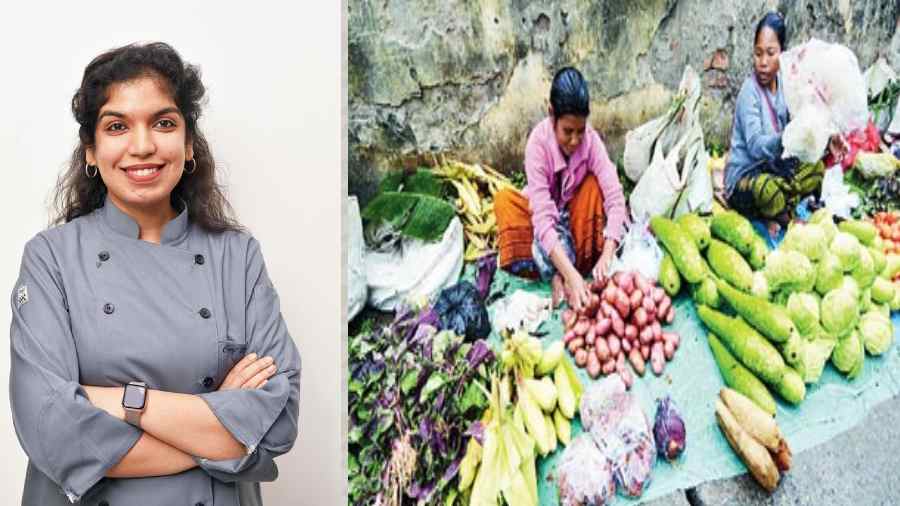Most of us grew up in an India that saw men as the breadwinner of the family. But the truth is, typically, they merely purchased the flour, yeast, salt, and butter and dumped it on the kitchen counter. It was the women who were tasked with actually fashioning these raw materials into bread. All of which is to analogically say that much of the nourishing and nurturing happened at their behest. And yet, for the most part, they continued shouldering this responsibility without taking much credit. Kind of like the yeast in the bread that quietly does its task, far away from the limelight. The reality today is pretty similar when it comes to giving credit to the multiple, albeit silent, women holding up the F&B industry.
Specifically, in my case, I see the light being shone brightly on chefs, restaurateurs, bloggers and recipe curators — the who’s who of F&B, in short. This is all great, but what about the women holding up this industry on their lean shoulders and behind the scenes? Right from house-cleaning to front-of-the-house, this industry has grown on the backs of multiple women. And it’s high time, their direct and indirect contributions at least made it to my column, if not another prestigious
30-under-30 list.
To help you understand the magnitude of their involvement, I’ll begin right at the bottom: our growers. As a chef-restaurateur — despite what it may seem like — a large part of our job is to look after the inventory, liaison with the right vendors, and if you care, source the right ingredients. And while many of these are fronted by men who drop the produce at my restaurant’s doorstep in Deshapriya Park or Bandra West, far away in Nadia district or Khalapur, there are women toiling the farms in the sun. Be it looking after the farms that grow our veggies, or those working on coffee plantations, sifting grains and pulses, drying, roasting, or hand-pounding spices, or even looking after the animals on farms from which we source our dairy products, much of the agricultural task force in India is composed of women. On tea plantations owned by my family, for instance, you will only see women picking tea leaves.
Then there’s a more direct role that women play. Big restaurants that can afford larger staff will always have separate house cleaning for the women’s washroom. Generally, too, they comprise a huge chunk of the house-cleaning industry that works with restaurants. Waitresses, receptionists, baristas, and production, which require organising mise en place and packaging — these are all many times, run by women. The pastry industry across the world, too, employs a large number of women. Brands that specialise in chocolates, truffles, biscuits, or products that are heavy on the packaging also rely veritably on female workers. The teams at home-grown chocolate brands like La Folie and Mason & Co, for example, have a predominantly all-women crew.
There are also direct vendors, such as fishmongers, where women play a much more pivotal role than men. For my restaurant in Mumbai, I source seafood from Lata didi, who by the way, is the go-to person for many other restaurants and eateries in the city because her quality is top-notch, plus she’s super accountable. In Kolkata, my cafe sources exotic and seasonal fruits, such as strawberries or mangoes, from a lady we refer to simply as Sampa didi.
Beyond this, there are women who directly take care of me and my staff. Our daily staff meals in both cities are procured from female-run, small businesses. To give you an example, in Kolkata, near my cafe, there’s a tuckshop run by a woman that sells snacks and food knick-knacks, which provides fuel to my team every morning and evening. In Mumbai, on the other hand, our staff meals are sourced from a dabbawalli who not only cooks and packs the food but also drops it off on her scooty. And this is all off the top of my head.
If I sat down to make a pie chart of the numerous contributions of women in F&B, behind the doors, I would require a data analyst for sure. But for some reason, there’s only a certain kind of woman that deserves our respect and recognition. While this is in a way indicative of our half-hearted understanding of equality, which all these years later continues to be applicable to a selective group of people in the society and is a long way off from becoming intersectional. It is also hugely representative of the sordid state within F&B itself.
The feminist movement was hinged on the understanding that after many years of having to be “doubly good”, the only way to further the cause of women empowerment would be to also double the efforts. In the context of the food industry, this would mean accepting the reality that employing women would come at an extra cost. This could mean incurring expenses for providing drops for your female employees at night, for instance, because in the end, it is our job to provide them with a safe working space. It could also entail having foolproof processes in place that ensure proper work-life balance, making arrangements for (and being okay with) maternity leaves, orienting your male staff to behave in a certain way, action changes that boost your female colleagues’ morale and in general, going that extra mile to help them become a part of our task force in a much bigger way while accounting for the myriad social impediments they may come with. Because without them, who are we really?
The author is a chef and owns The Daily in Kolkata and Cafe Duco in Mumbai
